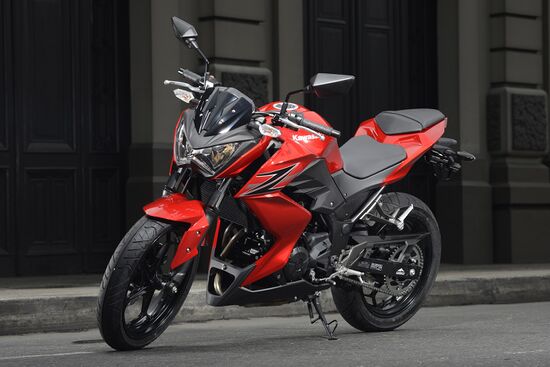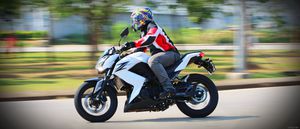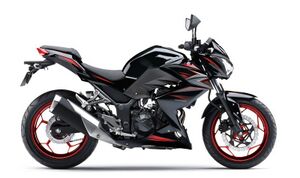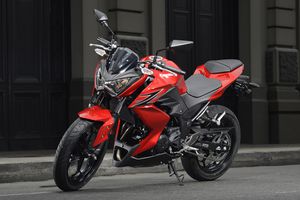Difference between revisions of "Kawasaki Z250"
m |
m |
||
| Line 2: | Line 2: | ||
__notoc__ | __notoc__ | ||
[[file: Kawasaki-Z250-Roja.jpg | 550px | center | Kawasaki Z250 (2013-2014)]] | [[file: Kawasaki-Z250-Roja.jpg | 550px | center | Kawasaki Z250 (2013-2014)]] | ||
| − | The naked model | + | The naked model Kawasaki Z250 appeared in 2013 as a budget representative of the Kawasaki Z-series road bikes. The model was mainly focused on the Asian market and was practically not supplied to European countries. |
{{Ads_top}} | {{Ads_top}} | ||
The Kawasaki Z250 is based on the second generation [[Kawasaki_Ninja_250R | Kawasaki Ninja 250R]] sports model, inheriting the frame, engine and chassis. | The Kawasaki Z250 is based on the second generation [[Kawasaki_Ninja_250R | Kawasaki Ninja 250R]] sports model, inheriting the frame, engine and chassis. | ||
Revision as of 15:45, 12 August 2021
The naked model Kawasaki Z250 appeared in 2013 as a budget representative of the Kawasaki Z-series road bikes. The model was mainly focused on the Asian market and was practically not supplied to European countries.
The Kawasaki Z250 is based on the second generation Kawasaki Ninja 250R sports model, inheriting the frame, engine and chassis.
The Kawasaki Z250 was based on an in-line 2-cylinder liquid-cooled engine with a volume of 249 cc and 31 hp. power and 21 Nm of torque. The maximum performance is at 8500-11000 rpm.
The frame of the motorcycle is a tubular steel structure, the suspensions are a conventional telescopic fork at the front and a progressive monoshock at the rear. Brake system - disc, front 1 disc 290 mm, rear - 1 disc 220 mm. Calipers - 2-piston.
Since 2015, based on Kawasaki Ninja 300, a new model has been proposed - Kawasaki Z300. In the Asian market, the Z250 version continued to be sold, which by this year received minor changes - ABS in standard equipment, as well as a slipping clutch with an assistant (Assist & Slipper Clutch).
As of 2018, the Kawasaki Z250 is out of production (there is a 2017 model on the market), although no end of production has been announced. Most likely, the resumption of production will be in the near future.
The main competitors of the Kawasaki Z250 in the class:
Photos
Specifications
Specifications Kawasaki Z250 and Kawasaki Z250 ABS:
| Model | Kawasaki Z250 / Z250 ABS |
|---|---|
| Motorcycle type | naked |
| Release year | 2013-2017 |
| Frame | steel diagonal |
| Engine type | 2-cylinder, 4-stroke, in-line |
| Working volume | 249 cm³ |
| Bore / Stroke | 62.0 x 41.2 mm |
| Compression ratio | 11.3: 1 |
| Cooling | liquid |
| Number of valves per cylinder | DOHC, 4 valves per cylinder |
| Fuel supply system | Double Throttle Injector |
| Ignition type | transistor |
| Maximum power | 31.0 h.p. (23.0 kW) at 11000 rpm |
| Maximum torque | 21.0 Nm (2.1 kg * m) at 8500 rpm |
| Gearbox | 6-speed |
| Drive type | chain |
| Front tire size | 110 / 70-17M / C (54H) |
| Rear tire size | 140 / 70-17M / C (66H) |
| Front brakes | 1 disc, 290mm, 2-piston caliper - (Z250 ABS - ABS) |
| Rear brakes | 1 disc, 220 mm, 2-piston caliper - (Z250 ABS - ABS) |
| Front suspension | 37mm Telescopic Fork (Fixed), 120mm Travel |
| Rear suspension | linkage Uni-Trak with monoshock (5-stage preload adjustment), 134 mm travel |
| Motorcycle length | 2015 mm |
| Motorcycle width | 750 mm |
| Motorcycle height | 1025 mm |
| Wheelbase | 1410 mm |
| Saddle height | 785 mm |
| Minimum ground clearance | 145 mm |
| Acceleration to 100 km / h | 7.7 sec. |
| Maximum speed | 155 km / h |
| Fuel tank capacity | 17.0 l |
| Motorcycle weight (curb) | 168 kg - Z250
170 kg - Z250 ABS |
Documentation



